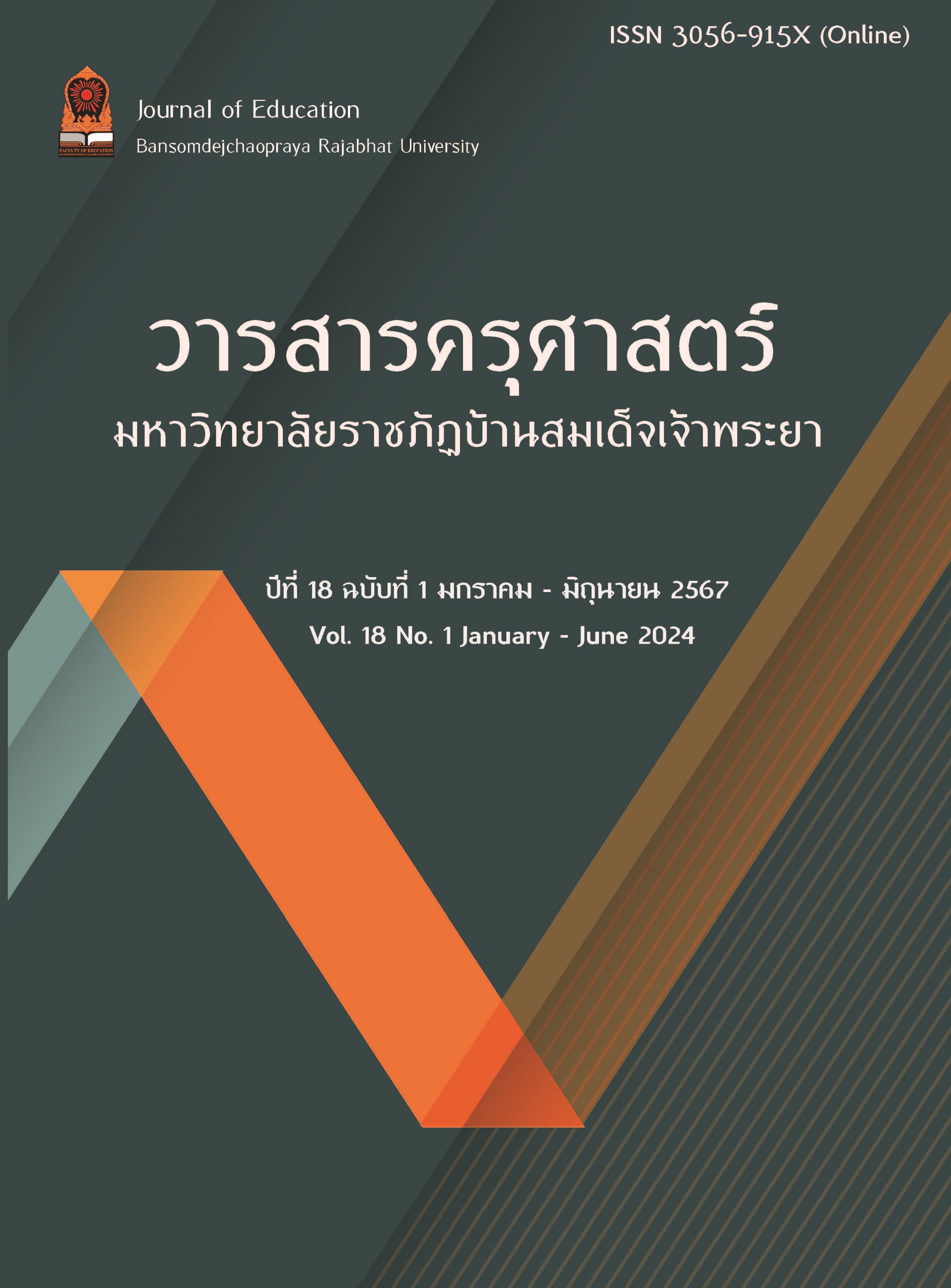The Cooperative Learning Outcome using Team Games Tournament Technique with Team Pair Solo Technique on Factorization of Second Degree Polynomials of Secondary 2 Students Nawamintharachinuthid Horwang Nonthaburi School
Keywords:
Factorization of second degree polynomials, Team games tournament technique, Team pair solo techniqueAbstract
The objective of this research was to compare the cooperative learning outcome using team games tournament technique with team pair solo technique, on factorization of second degree polynomials of Secondary 2 students at Nawamintharachinuthid Horwang Nonthaburi school with the 60% criteria. The research design is an experimental research. There is an experimental design as the one-group posttest design. The sample group is Secondary 2 students at Nawamintharachinuthid Horwang Nonthaburi School in the first semester of the academic year 2022, consisted of 1 classroom with 37 students, obtained by cluster random sampling which used the classroom as the sampling unit. The research tools consisted of a learning management plan and a cooperative learning test. The statistics used in the data analysis were percentage, mean, standard deviation and t-test for one sample. The test has an index of item objective congruence (IOC) between 0.67-1.00, an index of difficulty between 0.31-0.75, an index of discrimination between 0.25-0.75, and an index of reliability between 0.78-0.95.
The results of the research showed that the cooperative learning outcome using team games tournament technique with team pair solo technique, on factorization of second degree polynomials of Secondary 2 students at Nawamintharachinuthid Horwang Nonthaburi school was higher than the 60% criteria, at a significant level of .05
Downloads
References
กระทรวงศึกษาธิการ. (2551). หลักสูตรแกนกลางการศึกษาขั้นพื้นฐาน พุทธศักราช 2551. กรุงเทพฯ: โรงพิมพ์ชุมนุมสหกรณ์การเกษตรแห่งประเทศไทย.
กระทรวงศึกษาธิการ. (2560). ตัวชี้วัดและสาระการเรียนรู้แกนกลาง กลุ่มสาระการเรียนรู้คณิตศาสตร์ (ฉบับปรับปรุง พ.ศ.2560). กรุงเทพฯ: โรงพิมพ์ชุมนุมสหกรณ์การเกษตรแห่งประเทศไทย.
เฉลิม เพิ่มนาม. (2560). การพัฒนาผลสัมฤทธิ์ทางการเรียน เรื่อง การเขียนสะกดคำและทักษะทางสังคม ของนักเรียนชั้นประถมศึกษาปีที่ 3 โดยการจัดการเรียนรู้แบบร่วมมือ เทคนิค TGT ร่วมกับแบบฝึก. (วิทยานิพนธ์ศึกษาศาสตรมหาบัณฑิต, มหาวิทยาลัยศิลปากร.
ชลธิชา ต่อจรัส. (2557). ผลการใช้สื่อประสมประกอบการจัดการเรียนรู้คณิตศาสตร์ เรื่อง การแยกตัวประกอบของพหุนามดีกรีสอง สำหรับนักเรียนชั้นมัธยมศึกษาปีที่ 2. วิทยานิพนธ์ปริญญามหาบัณฑิต, มหาวิทยาลัยบูรพา.
พณพร นันทสุวรรณ. (2559). การพัฒนาแบบฝึกทักษะวิชาคณิตศาสตร์ เรื่อง การแยกตัวประกอบของพหุนามดีกรีสอง สำหรับนักเรียนชั้นมัธยมศึกษาปีที่ 2 โรงเรียนบดินทรเดชา (สิงห์ สิงหเสนี) สมุทรปราการ. วารสารออนไลน์บัณฑิตศึกษา คณะศึกษาศาสตร์ มหาวิทยาลัยรามคำแหง, 1-10.
สหรัฐ ลักษณะสุต. (2563). ผลการจัดกิจกรรมการเรียนรู้แบบร่วมมือเทคนิคเกมกลุ่มแข่งขันเพื่อพัฒนาผลสัมฤทธิ์ทางการเรียนภาษาอังกฤษของผู้เรียนชั้นมัธยมศึกษาปีที่ 3 โรงเรียนสาธิตมหาวิทยาลัยราชภัฏสวนสุนันทา. วารสารนวัตกรรมการศึกษาและการวิจัย, 4(3), 247-262.
อดิวัฒน์ เรือนรื่น. (2563). การศึกษาผลสัมฤทธิ์ทางการเรียนวิชาคณิตศาสตร์ เรื่อง จำนวนเต็ม ของนักเรียนชั้นมัธยมศึกษาปีที่ 1 โรงเรียนบ้านหนองเค็ด โดยใช้วิธีการสอนแบบ TGT. วิทยานิพนธ์ปริญญามหาบัณฑิต, มหาวิทยาลัยศิลปากร.
อุไร เปรมทา เจริญวิชญ์ สมพงษ์ธรรม วรรษิษฐา อัครธนยานนท์ และปาริชาติ สุภิมารส. (2564). การศึกษาผลการเรียนรู้กลุ่มสาระการเรียนรู้คณิตศาสตร์ เรื่อง การคูณ ของนักเรียนชั้นประถมศึกษาปีที่ 4 โรงเรียนในสังกัดสำนักงานเขตพื้นที่การศึกษาประถมศึกษาอุบลราชธานีเขต 4 โดยใช้แบบฝึกทักษะร่วมกับการจัดการเรียนรู้แบบร่วมมือ Team Pair Solo. วารสาร มจร อุบลปริทรรศน์, 6(2), 207-220.
Downloads
Published
How to Cite
Issue
Section
License
Copyright (c) 2024 Faculty of Educaion Bansomdejchaopraya Rajabhat University

This work is licensed under a Creative Commons Attribution-NonCommercial-NoDerivatives 4.0 International License.
บทความที่ได้รับการตีพิมพ์เป็นลิขสิทธิ์ของคณะครุศาสตร์ มหาวิทยาลัยราชภัฏบ้านสมเด็จเจ้าพระยา
ข้อความที่ปรากฏในบทความแต่ละเรื่องในวารสารวิชาการเล่มนี้เป็นความคิดเห็นส่วนตัวของผู้เขียนแต่ละท่านไม่เกี่ยวข้องกับมหาวิทยาลัยราชภัฏบ้านสมเด็จเจ้าพระยา และคณาจารย์ท่านอื่นๆในมหาวิทยาลัยฯ แต่อย่างใด ความรับผิดชอบองค์ประกอบทั้งหมดของบทความแต่ละเรื่องเป็นของผู้เขียนแต่ละท่าน หากมีความผิดพลาดใดๆ ผู้เขียนแต่ละท่านจะรับผิดชอบบทความของตนเอง



